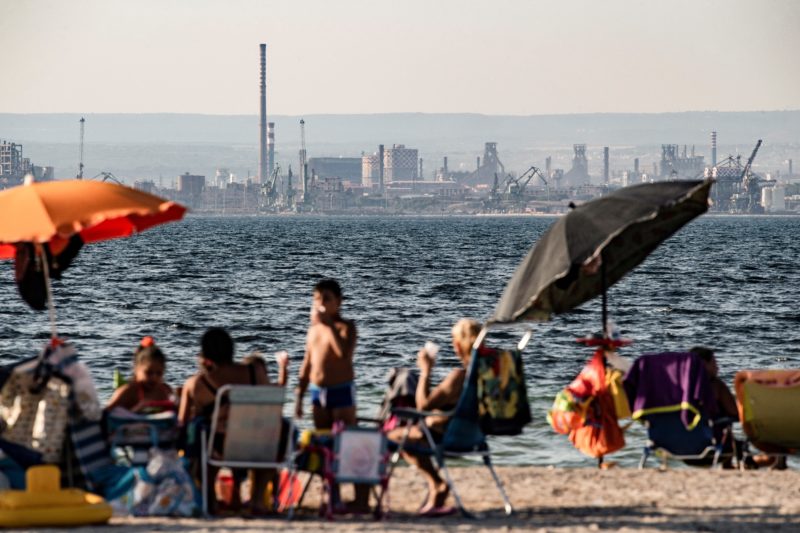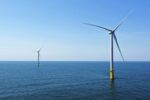‘Toxic’ Italian steel plant clean-up is a towering task
Arcelor Mittal Italia is cleaning up the Taranto steel plant, which has been linked for years to reports of severe health problems (Tiziana FABI)
Taranto (Italy) (AFP) – Rock climbers scale a giant canopy in Taranto to build the world’s biggest iron-ore park cover as steel giant ArcelorMittal strives to clean up and turn around Italy’s most polluting plant.
Beyond the factory lie the sea and sandy beaches, though only hardy souls dare to swim or eat mussels farmed here.
The site in southern Italy’s Puglia region, formerly owned by Ilva, is at the heart of a huge legal battle during which experts cited by prosecutors have charged that 11,550 people died from toxic emissions over seven years.
AcelorMittal began leasing the plant — with an obligation to buy it — in November, and is investing 2.4 billion euros ($2.67 billion) to revive it, including 1.2 billion euros to curb pollution by 2024.
The group was given a period of legal immunity to bring the plant up to environmental standards.
But the Italian parliament revoked that in June and the company is set to lose its immunity on September 6.
Group president Aditya Mittal told investors this month the government “recognizes there is a serious issue here” and is “working to resolve” it.
– ‘Biggest in the world’ –
Without immunity, ArcelorMittal Italia has said it might have to throw in the towel, despite having already begun implementing its clean-up plan, which includes enclosing conveyor belts and installing new quenching towers.
Red and black dust from parks of iron-ore and coal have long covered balconies and playgrounds in the nearby Tamburi and Paulo VI neighbourhoods, and locals shut themselves in and schools close when the wind blows their way.
Huge stockpiles, some 20 metres (yards) high, cover an area the size of 56 football pitches, the company says.
Work on mammoth white coverings to enclose them, which are to be 480 metres long, 250 metres wide and 80 metres high, is the most obvious sign of progress at the European Union’s largest steelworks.
The twin structures, each made of 20,000 tons of steel, will be “the biggest such structures in the world”, according to Henri-Pierre Orsini, who is responsible for implementing the plan.
“The object is to ensure zero dust emissions,” he told AFP.
The upgrades are aimed at reducing dust, metals and dioxins — through new fabric filtration technologies and dedusting systems — and stopping the run-off of polluted water.
– Papal prophecy –
The company runs tours for workers and their families to change how they view the plant and distance itself from its dark past and the graves in a cemetery just across the road.
As Taranto suffers from record unemployment some feel everything should be done to save the steel works, which employs 12,000 people.
But ArcelorMittal has struggled to win hearts.
In June it temporarily laid-off 1,400 workers owing to sluggish market conditions, and prosecutors launched an investigation in July after a worker was killed when a crane was blown into the sea.
The deadly accident sparked strikes.
And while the company pledges to slash dioxin and dust emissions to below EU limits, they cannot be eliminated entirely.
“The plant’s a huge economic resource. But are we supposed to all die just to save some jobs?” asked pensioner Giuliana Tomaselli, 64, as she gazed from her beach chair at the towering red-and-white striped chimneys.
Families who have been hit by abnormal levels of tumours and respiratory diseases around Taranto say the plant — a state-owned company until 1995 — should be closed, and the sprawling site cleaned up.
“They have fed families with this factory, but they have taken away so much from others,” said Angelo Di Ponzio, 46, whose son Giorgio died aged 15 in January after a three-year battle against cancer.
Giorgio was born in the Paulo VI neighbourhood named after Pope Paul VI who held a Christmas mass at the factory a few years after it opened in 1968.
The pontiff’s warning that the factory might boost the economy but that “man is worth more than machines and what they produce” is remembered bitterly by those who accuse the government and the plant’s previous owners of wilful negligence.
– ‘An explosion of life’ –
“Giorgio was an explosion of life, something incredible. He showed all the courage he had,” his mother Carla Luccarelli, 42, told AFP in the garden of their country home, where they moved in search of clean air after the boy fell ill.
The Di Ponzios, who have two other children, speak for many when they slam the anti-establishment Five Star Movement (M5S) for rowing back on its electoral promise to transform the plant into a clean energy park.
“People voted for M5S as a last resort. But they didn’t even wait three days before eating their words,” they said.
Disclaimer: Validity of the above story is for 7 Days from original date of publishing. Source: AFP.


